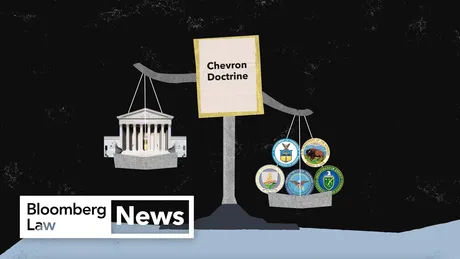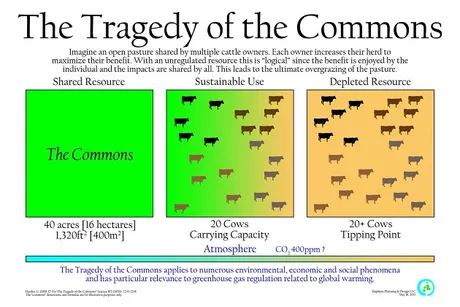
What is it?
Chevron deference, or Chevron doctrine, is an administrative law principle that compelled federal courts to defer to a federal agency's interpretation of an ambiguous or unclear statute that Congress delegated to the agency to administer.
When was it?
Last week, in a case called Loper Bright Enterprises v. Raimondo, the U.S. Supreme Court overturned the so-called Chevron doctrine, reversing a 40-year-old precedent that afforded federal agencies a degree of discretion in interpreting ambiguous laws in their areas of expertise.
What case overturned it?
Loper Bright Enterprises v. Raimondo pitted the owners of a New England fishing company against a federal agency, the National Marine Fisheries Service (NMFS). The Magnuson-Stevens Act sets catch limits to help prevent overfishing and requires fishing boats to have a government-appointed inspector onboard to monitor compliance.
Fishing companies incur the cost of these monitors—in plaintiff Loper Bright’s case, about $700 a day—but the company argued that NMFS had no authority to force it to do so. A district court disagreed, reasoning that Congress left that question open for the agency to decide. Applying Chevron, the court deferred to NMFS’s choice that the boat owner should pay. A federal appeals court affirmed this decision.
Fascinating.
So not only has Roe v Wade been overturned recently (50 years after the fact), but also now the supreme court sees fit to overturn a 40 year old precedent that has a hand in thousands of regulations. I think we can all agree that no matter where we stand on these issues this is all pretty insane. The judicial branch is going ham.
And let's be honest: forcing a fishing company to pay $700 A DAY so that they can legally do their job is pretty got damn ridiculous. It's not an easy situation to navigate. Overfishing is a problem; tragedy of the commons. Yada Yada Yada. But at a certain point enough is enough and we have to realize that all of the options available to us are kind of stupid, outdated, and unsustainable.

Supreme Court just made it harder for federal agencies to regulate in sweeping ruling
To get the Left's opinion on this issue we turn to NPR:
“Agencies report to the president, who in turn answers to the public for his policy calls,” she said. “Courts have no such accountability,” nor do they have the kind of expertise that agencies have to carry out broad mandates from Congress. Today, she said, a four decades-old “rule of judicial humility gives way to a rule of judicial hubris.”
“As if [the court] does not have enough on its plate,” she added acerbically, “the majority turns itself into the country’s administrative czar,” giving itself the power to determine what rules will govern AI, or the nation’s health care or transportation systems, or even the environment. “That is not a role that Congress gave to [the courts],” Kagan asserted, but “it is a role this court has now claimed for itself, as well as for other judges.”
I think it's interesting to make the claim that Congress didn't give the courts this power when we were all taught in school that these branches of government were equal, and they existed to balance the power in a system of checks and balances. To say that the courts derive their power from Congress completely undermines that entire line of thinking.
Hm, yeah also cryptocurrency; let's not forget crypto.
The XRP Army is quite pleased with this decision, which is how I first heard about it. They seem to think this repeal is going to pave the way for XRP to be used as a CBDC technology that will send the price to the moon. I think it's a pretty absurd take for a lot of reasons but I'm also just figuring out what this all means, much like everyone else.
This is very much a left vs right partisan issue, with the left in strong support of the Doctrine. Whereas the right celebrates this as a victory that takes away power from unelected bureaucrats and the executive branch that hires them. I can't say I'm personally too broken up about it considering that the SEC has been on crypto's shit-list for a decade straight. The SEC is indeed one of those unelected 3-letter-agencies that just seems to be making up the rules as they go at this point.
https://img.inleo.io/DQmVeoXjxYdzo4obREt5XJXJ16DhQRCQw2aaLHau5b9DpR8/maat-scales_cropped-heart-feather.jpg
Is this too much power for the judicial branch?
Honestly I have no idea but I'm curious to see where it goes. It's funny that so many people would argue that the interpretation of the law shouldn't go to the courts and judges, whose sole professional job is interpreting the law. Is the Left correct in the assessment that courts are not equipped and lack the technical expertise to fairly judicate these issues? Maybe. But also I've been following crypto cases like Ripple and Coinbase and they seem to be getting it right 99% of the time, whereas the unelected bureaucrats are the ones who find themselves constantly in the wrong (which is why these cases exist in the first place).
That being said, this could all go to a very dark place.
Everyone loves to complain about the "radical Left" running around and mucking everything up over the last however many years... but then on the flip side of the coin half-a-century-old legal precedent is being rolled back by the Right. That's not a very good sign when both the radical left and right are both in power at the same time. It's a great way to cause even more chaos, of which we have plenty already.
Conclusion
Is this rollback a 'good' thing? I have no idea. All I know is that it's a very significant thing that seems to be going completely under the radar. Just like most very important political decisions that get made within the shadows of an apathetic population.
As far as crypto is concerned the Chevron Deference disappearing can only be a good thing. This strips power away from the SEC, the CFTC, and the executive branch of the USG that elects them. The courts themselves have already shown they habitually side with crypto. Will there be blowback from all of this? I guess we'll just have to wait and see.
Return from Chevron Doctrine Annihilated to edicted's Web3 Blog
